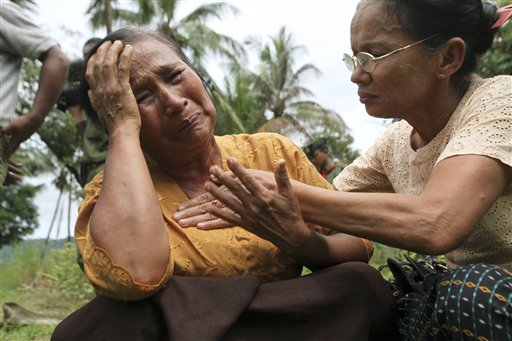President Thein Sein has accused “outsiders” of orchestrating this week’s outbreak of communal violence in Sandoway in western Burma, suggesting it was a premeditated attack intended to undermine his first ever visit to the conflict-torn region.
In a report published in state media, Thein Sein said he was “suspicious of the motives” behind the Sandoway riots, which left five Muslims dead and dozens of homes destroyed, and called for the perpetrators to be held to account.
“Participation of [everyone] is needed to expose and arrest those who got involved in the incident and those instigating the conflict behind the scene,” he told a gathering of Sandoway elders, including Kaman Muslims and Arakan Buddhists, according to Thursday’s edition of the New Light of Myanmar.
He reportedly blamed individuals driven by “external motives” for turning a trivial argument between a Muslim shop owner and Buddhist trishaw driver into an “unacceptable” outbreak of racial and religious violence.
Thein Sein insisted that the government would take swift action to identify and prosecute rioters without discriminating on the basis of religion, and called on community leaders to teach local youths not to be “deceived by instigators”.
The newspaper also reported that Gen Hla Htay Win from the Ministry of Defence, who was accompanying Thein Sein on a pre-scheduled tour of Arakan state, met with Sandoway locals to inspect the damage caused in the three-day clashes.
The article notes that Buddhist Sasana flags had been used to mark houses in order to avoid coming under attack – echoing reports from Meikhtila, where locals said Buddhists had distributed 969 stickers a week before similar violence flared in March. The 969 movement is an extremist Buddhist group preaching that Muslims are planning to take over the country and urged followers not to trade with them.
According to the New Light, Buddhist locals in Sandoway had been instructed to buy the flags from some unidentified local organisations, fuelling speculation that 969-aligned groups were behind the violence. The report added that an investigation would be held to uncover who was responsible for distributing the Buddhist flags.
On Wednesday, the Sandoway chairman of the Rakhine Nationalities Development Party, known for its inflammatory anti-Muslim rhetoric, and two members of a local nationalist group were held for questioning about their role in the unrest.
Burma has been swept by a tide of religious violence, increasingly targeting its minority Muslim population, since last year when Rohingya Muslims – who are denied citizenship and popularly reviled – clashed with Buddhists in northern Arakan state. The unrest has since spread through Burma’s heartlands, including Mandalay and the commercial capital Rangoon, targeting all Muslim communities.
Thein Sein has also come under fire for a perceived failure to stem the violence, which has already displaced over 140,000 mostly Muslims and claimed at least 200 lives.
[related]
Earlier this summer he defended 969 as a peaceful movement and banned a controversial edition of TIME Magazine that branded its main proponent, monk Wirathu, “The Face of Buddhist Terror”. Although the state-backed monks’ association, the Sangha Maha Nayaka, has since moved to ban 969 gatherings, there is little evidence that its leaders have been reproached.
Many foreign governments and the UN have urged Burma to do more.
Thursday’s admission is the strongest signal yet that Burma is willing to recognise the role of nationalist extremists groups in stirring up communal tensions. The government’s inertia has fuelled speculation that it is tacitly, if not actively, condoning abuses against Muslims, especially the Rohingya minority.
But rights groups continue to question the government’s commitment to tackle Buddhist extremism. Matthew Smith, the executive director at Fortify Rights, described Thein Sein’s comments as “vague” and unsatisfactory.
“His remarks appear to be an attempt to direct attention to an unseen mastermind, diverting attention from a mountain of damning evidence against his own government for its role in ongoing violence and abuses against large segments of the Muslim population,” he told DVB on Friday.
He slammed Thein Sein for doing nothing to address the plight of the Rohingya, who unlike the Kaman Muslims in Sandoway, are denied basic rights such as freedom of movement and the right to an education.
“The international community should disabuse itself of the convenient notion that the central government bears no responsibility for what is happening in Arakan state,” he said. “We would all like to believe their hands are clean but it’s simply untrue.”



